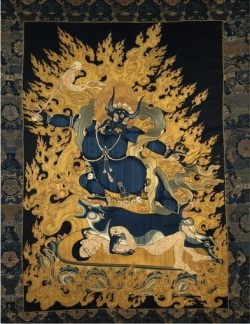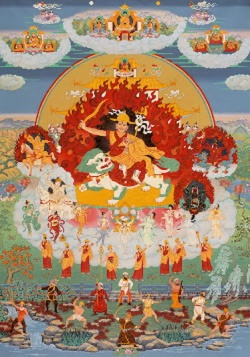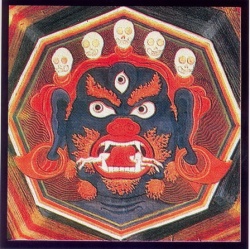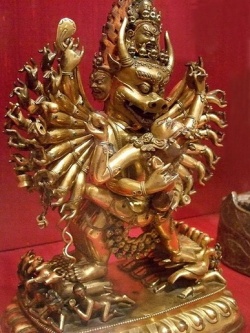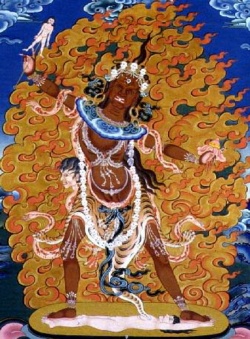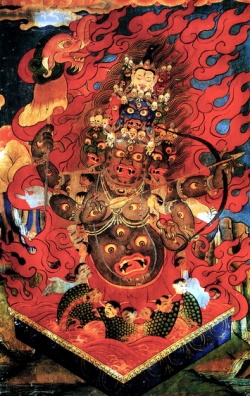Dharmapalas
This is not a subject that I care to write about, but I will try something anyway, because there seems to be a great deal of confusion. Herewith, the main thing I want to say:
Dharmapalas are not junkyard dogs
that we sic upon our perceived foes.
The textbook definition of a Dharmapala (chos-khyong), or "Dharma defender," or "protector," is that of a wrathful deity who "averts inner and outer obstacles to spiritual attainment."
I will be quite candid and tell you that it took me a very, very long time to come to grips with this definition, which I think can itself become an obstacle to clear understanding. I think a much better definition would be to say that dharmapalas are the wrathful personification of opportunities for spiritual attainment; opportunities that are not always immediately perceived as pleasant, or something wished for.
Most people go through life afraid of dharmapalas, which is a shame, when respect serves the issue much better than fear. The respect is really a respect for one's own posssibilities -- one's own potential, if you like that better -- because it is a respect that enjoins one from becoming too wrapped up in neurosis. So, in a very real sense, we could say that dharmapalas actually personify our own better natures -- almost to the level of an active "conscience," if that isn't taking undue liberty with cross-cultural signaling, and confusing the matter even more.
I have read two really splendid discussions of dharmapalas. The first was by Kyabje Dudjom Rinpoche's son, Shenpen Dawa Rinpoche. This is from a talk he gave in 1988, which you can find several places on the 'net. Since he obviously intended this to be confidential, I don't want to visit it too long. Nevertheless, I do not see the harm in disclosing that he made three very important points.
First, he said "...in the whole buddhadharma, one of the most complex things to explain is the dharmapalas. The reason for this is because we must be spoken to on our individual levels of realization; otherwise, it becomes a gross fabrication of a very, very subtle complex." This sounds like it might be discouraging, but actually, it is very encouraging, because it points to a highly specific, individualized explanation that will ultimately arise when necessary.
Next, he said, "...dharmapalas are the main working force of all the Buddhas, because they communicate the process of our mind." I think this is brilliantly stated, because it precisely explains how spiritual attainment becomes possible, as we enter into or engage difficult situations.
Finally, he said, "What dharmapalas really are is our confidence. They support our confidence to be able to reach out and help others. In fact, if we lack confidence, dharmapalas have a way of subtly communicating with us to bring our confidence back. Confidence is the right way of respecting the teachings, the right way of benefiting people. That is the confidence it will bring up in us." This is completely good news. How can anyone be afraid of that?
I think if you want to hear more of what he said, you should resolve to meet him in person, rather than go hunt down the bootleg copy of his presentation.
The second discussion of dharmapalas comes from Trungpa Rinpoche, and you can find this quite openly in that little book I mentioned the other day: Training the Mind and Cultivating Loving-kindness (1993).
In the context of a lengthy discussion of the transformation of bad circumstances, he characterizes dharmapalas as "sort of like shepherds." He writes:
"The dharmapalas represent our basic awareness, which is not so much absorbed in the meditative state of being but which takes place or takes care of us during the postmeditation experience."
How does it work? He explains:
"If you have the slightest temptation to step out of the dharmic world, the Protectors will herd you back -- hurl you back -- to that world. That is the meaning of asking the dharmapalas, or the Protectors, to help you in your practice."
Trungpa Rinpoche then goes into discussion of hidden neurosis, aggression, and all the underpinnings of spiritual life we experience but don't want to admit we experience. We don't want to admit this at all! He concludes his discussion of the subject with this admonition:
"...If true teaching has not been presented, we all could be struck down by that. So we are asking the Protectors to give us help and feedback through teachings, bankruptcies, through organizational mishaps, through being millionaires, or through work in general. It is all included."
That says it all, doesn't it?
So, the day may come when we are in the middle of heated contention with people we perceive as foes, and we might become very exasperated with the whole situation and start making all sorts of offerings to the Protectors.
We might ask the Protectors to "smite the foe," as it were, which subsumes some sort of satisfaction when the foe is smitten.
However, that sense of exasperation (fear), and that belief in a forthcoming satisfaction (hope), is precisely the sort of straying from the Dharma that will cause the Protectors to correct us -- sometimes very abruptly, you know?
Because it is a kind of cowardice. We are trying to avoid fixing the situation ourselves, and are instead calling on the Protectors to do the dirty work for us: "go give that son-of-a-bitch what he's got coming," rather than open-heartedly embracing Dharma's inherent gentleness at the very time when it is needed the most. This, too, will earn the attention of the Protectors, and again -- this can be very abrupt. Protectors protect us from ourselves.
You know, when I was a child, sometimes I was naughty. In the midst of naughtiness, sometimes I would stub my toe or bark a shin, and I would howl. My mother always used to smile, and say, "that's your protector." That invariably made me even more frustrated, until one day she said that, and I just started to laugh because it suddenly seemed so true.
Similarly, you may be in a situation where you have been practicing all sorts of wickedness because you have either been wrongly taught, or you have some obstacle to understanding what you have been rightly taught. This could extend to the organizational level, wherein an entire group of people have been ham-fisted and wooden-headed for so long that the result of their ham-fisted woodenheadedness becomes inevitable. They might start looking around for a scapegoat to blame, and having found one, they might swear out the Protectors, so that they can feel blameless -- and of course, satisfied.
My, but that is dangerous ground!
Protectors do not always germinate misfortunes. Sometimes, the correction can come in really unexpected ways. This is like the old joke about the Buddhist. His mother died, he had a heart attack, and then he wound up in jail. He was doing really well with all of this, until one fine day he won the lotto, and that completely brought him down!
You know, I see things like this all the time. For example, I know of a case involving a nun. She didn't feel very comfortable practicing where she was, so she decided to go practice elsewhere. The other nuns and monks she left behind became rather unaccountably angry about this, and started accusing her of breaking her vows, and all sorts of other nonsense. They started saying things like, "we'll remember her when we do protector prayers." They didn't want her to be protected, mind you. What they wanted was for her to be punished for leaving them. Over a year after she left, they were still stalking her, making all sorts of threats, and generally trying to make things unhappy for her. One of them even wrote this puerile little poem:
Chicken-lickin' good
They say-
When predator becomes
The pray.
When secrets all
Come out to play
And darkest night
Returns to day
Protectors LOVE this
Kinda swing
Defending Dharma
Is their thing!
So we will many
Offerings bring.
And they continue
To take wing!
They call and fly
While they sing
They'll stomp and
Deal with
ALL your flings!
For false prophets
It will sting, and sting.
Gotta hide!
Gotta run!
Before this very year
Is done
We'll be having fun,
Just wait and see!
Flip the rocks,
You see the bums.
Melting in the
Light of sun
No one' gonna love it
Quite like me.
You know, when I read this, I felt such sadness. This is not Dharma. This is witchcraft. Read it again, and as you do, realize that it was written by someone who thinks of his or herself as a "Dharma practitioner," and a "member of a Sangha." What do you think? Do those descriptions rightly apply? Has the author embraced the Dharma, or strayed from the Dharma? Do you think this person's teacher feels satisfaction when seeing this? Thousands of people read this 'blog, and I would really like to hear at least some of your opinions -- or at least the opinion of those with confidence (and idle time) enough to state an opinion.
I have written this little post today with the intention that it be of some benefit to people who are confused about Protectors: people who are trapped by hopes and fears. There is no question that the energy involved is incredibly powerful -- powerful enough to bring you to the mat -- but, the end result is I think gentleness, or at least an appreciation of gentleness. Gentleness and openness, without all the subtext about aggression, revenge, contention, slyness, and the lot.
We might think we're getting away with something, and we might enjoy some success at that for a little while, but in the end -- and here I discard risk of repeating myself and embrace repetition wholeheartedly -- there is absolutely no replacement for authentic presence. Authentic presence makes contrivances unnecessary. Hope and fear evaporate in the all-illuminating light of the great sun.
"May the knot of hope and fear be freed within vast and infinite pervasiveness!"
I will honestly tell you what you probably already know: that I don't know very much about this subject. I cannot in good conscience even say that these are things I have heard. There is only this little that I have read, a few tiny things I have heard here and there, and the rather more gargantuan corpus of mistakes I have made, and continue to make, albeit always with the very best of intentions. Thus, while I may not be eminently qualified to wield a bucket and mop, at the charitable least my many bruises, bumps, and scrapes entitle me to an opinion about slippery floors.
Dharmapalas are not bogeymen. They are not a story we use to frighten children into behaving themselves. They are not demons unleashed by spells and incantations. They are not a threat that Buddhists use against each other.
Please, if you are a real Buddhist, I am asking you so respectfully and politely, not to condemn yourself by begging the Protectors to serve your malfunctioning emotions. Don't invoke that energy to harm another person with whom you disagree. It cannot possibly harm the object of your aggressive fantasies, but it can absolutely destroy you and those around you.
We have all seen a sparrow repeatedly fly into a windowpane. Because of the sparrow, I have written this.
Only this reason.
